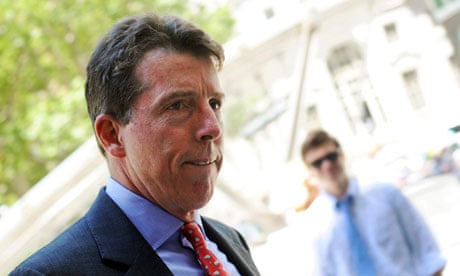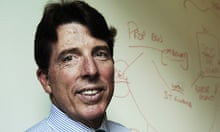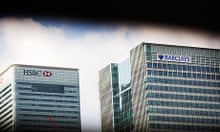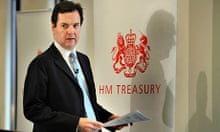Bob Diamond said today that he felt "honoured" and "extremely motivated" after being named as the next chief executive of Barclays. Reaching the top tier of British business after a blistering career that made him hugely wealthy, he has delivered huge profits for shareholders but has also been heavily criticised for his role in the rise of "casino banking".
Diamond's promotion comes a little more than three decades after he swapped academia for high finance and after he lost out on the key job in 2004 when John Varley was awarded the helm of Barclays. The Massachusetts-raised Diamond – one of nine children – was awarded the top MBA from University of Connecticut Business School, and took up a lecturing position there. But in 1979 he moved into investment banking with Morgan Stanley, apparently inspired by a friend who had joined the firm. Starting out as a bond trader he rose fast, moved to Credit Suisse and by 1992 was running its Asian operation. In 1996 Barclays came calling and Diamond joined its stockbroking arm, BZW.
BZW was a lower-tier operation, but the move turned out to be inspired. Within a year it had merged with the fund management and trading arms of Wells Fargo and Nikko Securities to form Barclays Capital. This gave Diamond the weaponry to start creating an investment banking powerhouse.
This empire building did cause ructions. In 2005, insiders suggested that Roger Davis, head of UK banking at Barclays, quit partly in frustration at Diamond's rise.
Diamond came to the public eye after BarCap's stellar growth meant it was providing an increasingly larger chunk of Barclays's overall profits. Commercial and retail banking used to be Barclays's backbone, but Diamond and his troop of investment bankers have become more and more important to the company. In 2007, he took home a pay packet worth £27m, triggering a debate about whether such remuneration could be justified even if it was performance-related.
Such pay packets became more toxic after the financial crisis struck, and investment bankers were excoriated for both fuelling the excesses of the boom and profiting from it. Lord Mandelson condemned Diamond as the "unacceptable face of banking" earlier, after it emerged that he had received cash and share awards that could net him £63m over the next few years.
Supporters, though, point out that Diamond has built an investment bank virtually from scratch in under 15 years.
Two years ago Diamond was named as an adviser to Boris Johnson, ahead of his victory in the race to become London mayor. He is now an adviser on the Mayor's Fund for London.
When not at work, Diamond is a fanatical sports fan, supporting Chelsea (football), the Boston Red Sox (baseball) and the New England Patriots (American football). He has also created the Diamond Family Foundation which has given millions of dollars to education projects.
The City has been mesmerised by what has been perceived to be a power struggle between Varley and Diamond and today Diamond was exuding his usual charisma on an early morning call with reporters when he joked that the media would be bereft of the usual questions about his relationship with the departing chief executive.




